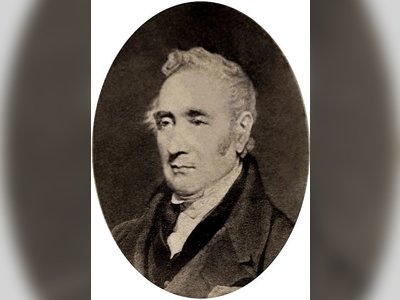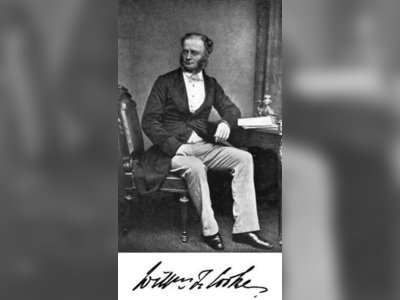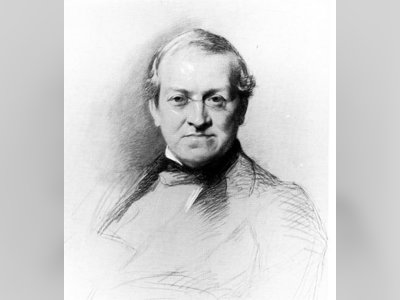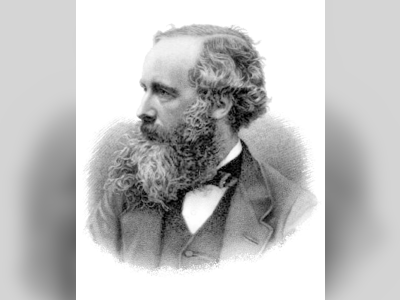British Heritage
Remember, Cherish, Learn.
beta
Kane Kramer - The iPod

The Forerunner of Modern Digital Music and his Undeniable Legacy in British Heritage.
Kane Kramer, a British inventor and businessman, undeniably occupies a unique position in the annals of modern technology. His impact on British heritage extends far beyond his nationality; it lies in his seminal contribution to the world of digital music. The conceptual groundwork he laid forms a key component in the digital audio landscape we take for granted today. His invention of the digital audio player in the late 20th century paved the way for what we now recognize as the ubiquitous iPod, forever transforming how we interact with music.
In 1979, Kramer envisioned a digital future of music, conceptualising the idea of a portable digital audio player, christened the IXI. The digital audio player was conceived at a time when most of the world was still revolving around analog audio technology, which makes Kramer's vision all the more prescient. In 1981, he filed a UK patent for this groundbreaking idea, with UK patent 2115996 granted in 1985, followed by U.S. Patent 4,667,088 in 1987.
The IXI prototype was ahead of its time, even by today's standards. Its compact size, akin to a credit card, harboured a small LCD screen alongside navigation and volume controls. The device could accommodate 8 MB of data, equivalent to 3½ minutes' worth of audio, stored on a solid-state bubble memory chip. Despite the constraint of storage, plans were in place for a 10-minute stereo memory card, and the system had the potential for a hard drive, enabling over an hour of recorded digital music. It was an ambitious project that promised a revolution in personal audio technology.
In 1986, Kramer unveiled a pre-production prototype at the APRS Audio/Visual trade exhibition. His invention attracted significant interest, including an investment from Sir Paul McCartney. It even drew an astonishing £60 million worth of orders from the recording industry, reflecting the magnitude of its anticipated impact. But despite its potential, a company dispute and financial setbacks in 1988 led to the patent lapsing into the public domain.
Almost two decades after the IXI's creation, the world witnessed the birth of Apple's iPod. As disputes over the iPod's origins brewed, Apple turned to Kramer's earlier invention as part of its defense against charges of patent infringement. As a result, Kramer's forgotten creation was resurrected and brought back into the public consciousness. His brainchild had unmistakably foreshadowed the path of digital music players, even if it didn't bear fruit in its original form.
Despite the challenges and setbacks, Kramer has remained professionally involved in the technology sector. His passion for invention has only strengthened with time. Today, he serves as the Chairman of the British Inventor's Society and the organizer of the British Invention Show & World Invention Awards. Kramer's voice on innovation is sought after worldwide, with speaking engagements that have ranged from addresses to Argonne National Laboratory architects to following Al Gore on the subject of climate change at the Royal Courts of Justice.
Additionally, Kramer ventured into the world of film and television, directing and producing the documentary "Disparity," which completed filming in late 2018. His earlier productions include "10CC Live in Concert at Wembley" in 1982 and "The Sweet Live in Concert at the Marquee Club in London" in 1986.
Kane Kramer's legacy is reflected not just in the British heritage, but in the global digital landscape as we know it. Though he might have been denied the chance to fully realise his original vision, his idea served as a foundation for the digital music revolution. His creative genius and tenacity continue to influence a whole new generation of inventors and innovators, reaffirming his significant contributions to British heritage and the wider world.
Inventive Genius: The Birth of the Digital Audio Player (DAP)
In 1979, Kramer envisioned a digital future of music, conceptualising the idea of a portable digital audio player, christened the IXI. The digital audio player was conceived at a time when most of the world was still revolving around analog audio technology, which makes Kramer's vision all the more prescient. In 1981, he filed a UK patent for this groundbreaking idea, with UK patent 2115996 granted in 1985, followed by U.S. Patent 4,667,088 in 1987.
The IXI prototype was ahead of its time, even by today's standards. Its compact size, akin to a credit card, harboured a small LCD screen alongside navigation and volume controls. The device could accommodate 8 MB of data, equivalent to 3½ minutes' worth of audio, stored on a solid-state bubble memory chip. Despite the constraint of storage, plans were in place for a 10-minute stereo memory card, and the system had the potential for a hard drive, enabling over an hour of recorded digital music. It was an ambitious project that promised a revolution in personal audio technology.
In 1986, Kramer unveiled a pre-production prototype at the APRS Audio/Visual trade exhibition. His invention attracted significant interest, including an investment from Sir Paul McCartney. It even drew an astonishing £60 million worth of orders from the recording industry, reflecting the magnitude of its anticipated impact. But despite its potential, a company dispute and financial setbacks in 1988 led to the patent lapsing into the public domain.
Legal Battles and the iPod Testimony
Almost two decades after the IXI's creation, the world witnessed the birth of Apple's iPod. As disputes over the iPod's origins brewed, Apple turned to Kramer's earlier invention as part of its defense against charges of patent infringement. As a result, Kramer's forgotten creation was resurrected and brought back into the public consciousness. His brainchild had unmistakably foreshadowed the path of digital music players, even if it didn't bear fruit in its original form.
Kramer's Continued Impact in the Tech World
Despite the challenges and setbacks, Kramer has remained professionally involved in the technology sector. His passion for invention has only strengthened with time. Today, he serves as the Chairman of the British Inventor's Society and the organizer of the British Invention Show & World Invention Awards. Kramer's voice on innovation is sought after worldwide, with speaking engagements that have ranged from addresses to Argonne National Laboratory architects to following Al Gore on the subject of climate change at the Royal Courts of Justice.
Additionally, Kramer ventured into the world of film and television, directing and producing the documentary "Disparity," which completed filming in late 2018. His earlier productions include "10CC Live in Concert at Wembley" in 1982 and "The Sweet Live in Concert at the Marquee Club in London" in 1986.
Kane Kramer's legacy is reflected not just in the British heritage, but in the global digital landscape as we know it. Though he might have been denied the chance to fully realise his original vision, his idea served as a foundation for the digital music revolution. His creative genius and tenacity continue to influence a whole new generation of inventors and innovators, reaffirming his significant contributions to British heritage and the wider world.
- Kane Krameren.wikipedia.org
- Apple admit Briton DID invent iPod, but he's still not getting any moneyApple has finally admitted that a British man who left school at 15 is the inventor behind the iPod.dailymail.co.uk




